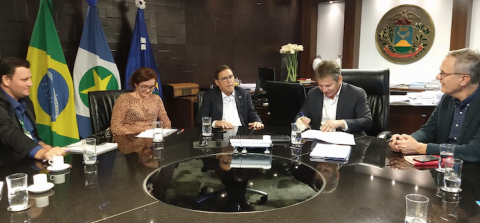EII and Mato Grosso sign agreement on emission reduction strategies
Earth Innovation Institute and the Brazilian state of Mato Grosso have signed an agreement covering a range of climate and conservation-related issues that could help guide Brazil’s third-largest state and its leading agricultural producer toward a path of more sustainable growth. The agreement was signed during a meeting Thursday in the state capital Cuiabá between Mato Grosso Governor Mauro Mendes and EII Executive Director Dan Nepstad.

Under the terms of the agreement, EII will provide Mato Grosso, which is twice the area of California, with technical support on strategies to attract investments in its emissions reductions, on supporting the development of a “climate neutral soy” product, increasing the efficiency of its environmental licensing process, and supporting the state’s aquaculture program.
Mato Grosso is one of the world’s leading soy producers, and is Brazil’s top producer of cattle and cotton, among other commodities. The state has also been a leader in reducing deforestation in past years even as it dramatically expanded its agricultural output.
Among the initiatives covered under the agreement is the Produce, Conserve and Include (PCI) program, which provides credible, transparent monitoring on deforestation, production and legal compliance across the state, mechanisms that are critical to attracting greater outside investment.
“If successful, the PCI strategy could keep 4 billion tons of CO2 in Mato Grosso’s trees and out of the atmosphere,” said Nepstad after the signing.
Other items in the agreement include support for developing Mato Grosso’s aquaculture industry, which could help reduce deforestation rates caused by the expansion of the state’s cattle industry. In May EII introduced its “Back to Fish Strategy” at a meeting of the Governors’ Climate and Forests Task Force (GCF) in Caquetá, Colombia. The program aims to assist Amazon regions including Mato Grosso make the transition to a more fish-based and low-emission development strategy.
Thursday’s signing also included an agreement by Governor Mendes to become a founding member of EII’s Tropical Forest Champions, which aims to support tropical forest states and jurisdictions in securing investments in their emission reduction efforts.
“This agreement means that across the entire range of EII’s work in Mato Grosso, we will now have the official support of the state government,” said Monica de Los Rios, EII’s National Program Coordinator for Brazil. “And under this we can include all the agencies and secretaries of the state in partnering on these efforts.”
